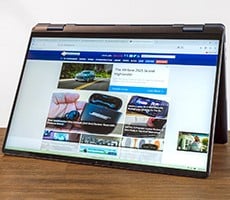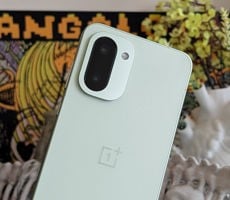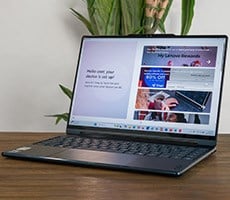Samsung Epic 4G Android Smartphone Review
The most popular and powerful Android phones currently available are quite possibly members of the Samsung Galaxy S line. Powered by Samsung’s very own 1GHz Cortex A8-based Hummingbird processor and featuring a four-inch Super-AMOLED (active matrix organic light-emitting diode) capacitive touchscreen with a 480x800 resolution, it’s no wonder that Samsung has already sold over 5 million Galaxy S-branded phones. The latest member of the Galaxy S family is the Samsung Epic 4G Android Smartphone, which adds two unique features that the other Galaxy S handsets lack: a slide-out keyboard and 4G capabilities.
The Epic 4G is available through Sprint for $249.99 (after a $100 mail-in rebate), with a two-year contract. If you want one without a contract, it will cost $499.99. The least expensive plan available for the phone is $69.99 per month, which includes 450 “Anytime Minutes” for voice calls, and unlimited data and messaging. For $99.99 per month you can get a plan that offers unlimited voice calling. Sprint also offers a number of family plans that range in price from $129.99 to $189.98 for two lines (additional lines cost $19.99 per month per line). Regardless of which plan you choose, you’re also required to add a $10 per month “Premium Data” service, for access to Sprint’s 4G network—whether you use the 4G connection or not. Factor in taxes and fees, and the least expensive service plan will wind costing you roughly $90 per month.
Sprint’s 4G network utilizes WiMAX (Worldwide Interoperability for Microwave Access) mobile broadband technology, which currently has a theoretical maximum throughput of 40Mbps. Sprint claims that the average download speed on its 4G network is between 3 to 6Mbps, with “peak” download speeds above 10Mbps. On our tests, which you can see here, we saw 4G throughput speeds that varied anywhere between 1.82Mbps and 7.96Mbps for downstream connections, and from 0.33Mbps to 1.16Mbps for upstream connections—depending on the particular test. For comparison, the fastest 3G downstream connection we’ve seen is around 1.4Mbps, with the average 3G connection speed usually well below 1.0Mbps. The speediest 3G upstream speed we’ve seen is around 0.7Mbps, with the average more like 0.4Mbps.
The trouble is, unless you live in one of the few areas where WiMAX coverage is available, you won’t be able to take advantage of 4G’s faster speeds. In fact, while we were able to get a 4G connection during our testing, it was in an area that didn’t officially have Sprint 4G coverage—the 4G towers were still in “testing” mode. You can take a gander at Sprint’s coverage map here. If you live in Baltimore or Chicago you’re in luck, but if you live in Los Angeles or New York, you’re going to have to wait a little longer before 4G gets officially turned on.
|
| CPU | 1GHz Samsung Cortex A8 Hummingbird |
| Platform | Android 2.1 (will be upgradeable to 2.2) |
| Memory | 512MB system memory, 16GB microSD card included |
| Dimensions | 4.9 x 2.5 x 0.6 inches |
| Weight | 5.47 ounces |
| Display | 4-inch Super AMOLED capacitive touchscreen WVGA 480x800 |
| Network | Dual-band (800 and 1900MHz) CDMA2000 1x EV-DO rev. A, WiMAX |
| Connectivity | 802.11b/g/n, Bluetooth 2.1 with A2DP stereo and EDR, DLNA, Mico USB |
| Cameras | Front-facing VGA camera, rear-facing 5.0-megapixel camera (2,560x1,920) |
| Music | 3.5mm headset jack, Music Player (AAC, MIDI, MP3, WMA, XMF) |
| Video | MPEG4, AAC, AAC+, H.263, H.264 |
| Battery | 1,500mAh Li-ion |
| Additional Features | Slide-out QWERTY keyboard, A-GPS, speakerphone, digital compass, six-axis motion sensor, proximity sensor, accelerator, light sensor, SWYPE |
The Epic 4G comes with one other cool feature. For an additional $29.99 per month, you can add Sprint’s “Mobile Hotspot” service, which allows you to use the Epic 4G as a wireless Internet router for up to five connected devices. Any device, such as a laptop or iPad, that connects to the Epic 4G via a Wi-Fi connection, can piggyback on the Epic 4G’s mobile broadband connection. This works whether the Epic 4G has a 3G or 4G connection—obviously 4G will be much faster.
There are presently three other Samsung Galaxy S phones on the market: T-Mobile’s Samsung Vibrant, Verizon’s Samsung Fascinate, and AT&T’s Samsung Captivate. You can read our review of the Captivate here. A fifth Galaxy S phone is due out very soon, the Samsung Mesmerize for US Cellular.







